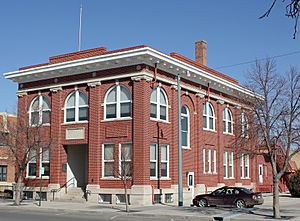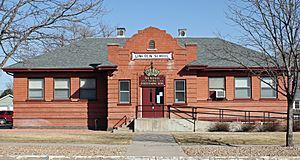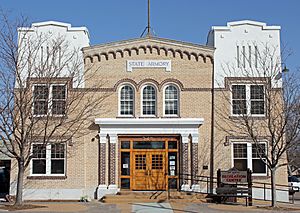Fort Morgan, Colorado facts for kids
Quick facts for kids
Fort Morgan, Colorado
|
|
|---|---|
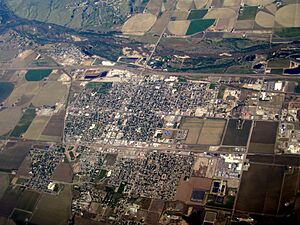
Aerial view of Fort Morgan (2017)
|
|
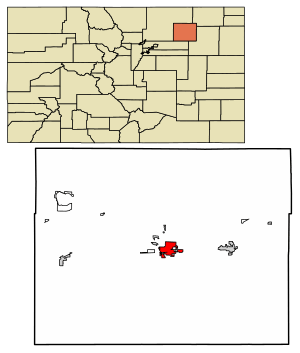
Location of the City of Fort Morgan in Morgan County, Colorado.
|
|
| Country | |
| State | |
| County | Morgan County seat |
| Incorporated | June 15, 1887 |
| Government | |
| • Type | Home rule municipality |
| Area | |
| • Total | 5.403 sq mi (13.993 km2) |
| • Land | 5.334 sq mi (13.815 km2) |
| • Water | 0.069 sq mi (0.178 km2) |
| Elevation | 4,328 ft (1,319 m) |
| Population
(2020)
|
|
| • Total | 11,597 |
| • Density | 2,174/sq mi (839/km2) |
| • Metro | 29,111 |
| Time zone | UTC−07:00 (MST) |
| • Summer (DST) | UTC−06:00 (MDT) |
| ZIP codes |
80701 & 80705
|
| Area code(s) | 970 |
| FIPS code | 08-27810 |
| GNIS feature ID | 0204722 |
Fort Morgan is a city in Colorado, United States. It is the main city and county seat of Morgan County. In 2020, about 11,597 people lived there. Fort Morgan is known as a "home rule municipality," which means it has its own local government rules.
Contents
History of Fort Morgan
The Original Fort
A military camp called Camp Wardwell was set up in 1865. It was located along the Overland Trail. This camp helped protect people and supplies traveling to and from Denver. In 1866, the camp was renamed Fort Morgan. It was named after Colonel Christopher A. Morgan, a staff member of General John Pope. The fort was used by many soldiers but closed down in 1868.
The Town of Fort Morgan
The town of Fort Morgan was started near the old fort's ruins. This happened on May 1, 1884. Abner S. Baker, from Greeley's Union Colony, planned the town. Fort Morgan became the main city of Morgan County on February 19, 1889. During World War II, a military school operated in Fort Morgan. It was part of the West Coast Air Corps Training Center.
Geography and Climate
Fort Morgan covers an area of about 14 square kilometers (5.4 square miles). Most of this area is land, with a small part being water. The city is located at an elevation of about 1,319 meters (4,328 feet) above sea level.
Fort Morgan's Climate
Fort Morgan has a semi-arid climate. This means it gets some rain, but it's generally dry. Summers are warm, and winters are cold.
Population and People
| Historical population | |||
|---|---|---|---|
| Census | Pop. | %± | |
| 1890 | 488 | — | |
| 1900 | 634 | 29.9% | |
| 1910 | 2,800 | 341.6% | |
| 1920 | 3,818 | 36.4% | |
| 1930 | 4,423 | 15.8% | |
| 1940 | 4,884 | 10.4% | |
| 1950 | 5,315 | 8.8% | |
| 1960 | 7,379 | 38.8% | |
| 1970 | 7,594 | 2.9% | |
| 1980 | 8,768 | 15.5% | |
| 1990 | 9,068 | 3.4% | |
| 2000 | 11,034 | 21.7% | |
| 2010 | 11,315 | 2.5% | |
| 2020 | 11,597 | 2.5% | |
| U.S. Decennial Census | |||
In 2020, the population of Fort Morgan was 11,597 people. The city has grown steadily over the years. In 2000, about 30% of the population was under 18 years old. The average age was 32 years.
Economy and Jobs
The economy of Fort Morgan is mostly based on agriculture. This means many jobs are related to farming and food production.
- Cargill: A large company called Cargill has a meatpacking plant in Fort Morgan. Many people from different backgrounds work here.
- Western Sugar: Western Sugar Cooperative also has a major plant in the city. They process sugar beets.
Education in Fort Morgan
Fort Morgan is home to Morgan Community College. This college offers different programs for students.
Media and Communication
Newspaper
The local newspaper for the city is called the Fort Morgan Times. It shares news and stories about the community.
Radio Stations
Fort Morgan has several radio stations:
- KSIR 1010 AM and KRFD (FM) 94.5 broadcast from the city.
- KFTM 1400 AM is a local radio station known as "Hometown Radio."
- BOB FM 97.5 KSRX plays music and serves both Sterling and Fort Morgan.
Transportation
Train Travel
Amtrak, the national passenger train system, serves Fort Morgan. The California Zephyr train stops here every day. This train travels between Chicago and San Francisco.
Air Travel
Fort Morgan has a local airport called Fort Morgan Municipal Airport. However, it is only for private planes. There are no regular passenger flights from this airport. The closest major airport with scheduled flights is Denver International Airport, which is about 76 miles away.
Main Roads
Several important highways pass through or near Fort Morgan:
- Interstate 76
- U.S. Highway 34
- State Highway 52
- State Highway 144
Famous People from Fort Morgan
Fort Morgan has been home to several notable people:
- Glenn Miller: A famous Big Band musician, Glenn Miller, spent his childhood in Fort Morgan. He played the trumpet in high school here.
- Joel Dreessen: A former professional football player for the Denver Broncos, Joel Dreessen grew up in Fort Morgan. He played tight end.
- Ryan Jensen: Another football player, Ryan Jensen, played center for the Super Bowl Champion Tampa Bay Buccaneers. He also grew up and played football in Fort Morgan.
- Michael Crichton: The famous author Michael Crichton lived in Fort Morgan for a short time as a child during World War II.
- Brenton Metzler: A TV producer, Brenton Metzler, moved to Fort Morgan when he was 16 and graduated from the high school.
See also
 In Spanish: Fort Morgan (Colorado) para niños
In Spanish: Fort Morgan (Colorado) para niños
 | Selma Burke |
 | Pauline Powell Burns |
 | Frederick J. Brown |
 | Robert Blackburn |



